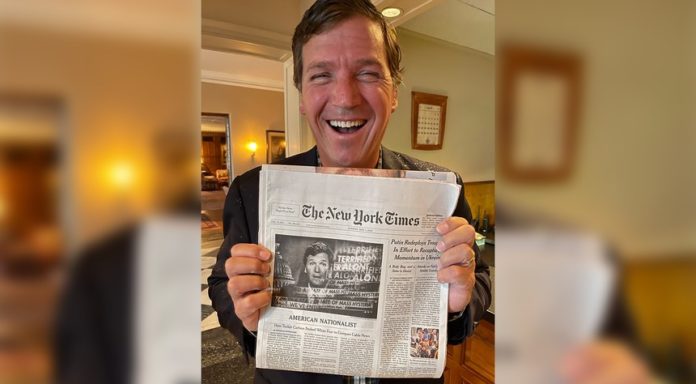The New York Times has published a detailed analysis of the second attempt by the Biden administration to form a misinformation task force to regulate social media and news outlets. The subheading is both troubling in its scope and the lack of criticism directed at the government’s overreach suggested that: Many federal agencies agree that widely propagated falsehoods pose a threat to the nation’s safety. It is quite another to do something about them.
The Times also addressed Nina Jankowicz, the deposed director of a failed disinformation board attempt, without critiquing her.
“A prominent author and researcher in the field of disinformation, who once advised Ukraine’s government, Ms. Jankowicz became a focus of the furor, targeted online by false or misleading information about her role in what critics denounced as a Ministry of Truth”.
Their truncated bios of Jankowicz miss out on her exposed forays into disinformation. Jankowicz claimed that the Hunter Biden laptop story was faked by Russia, but she denies she suggested having Twitter accounts verify user content. She is also on video saying this-and was an enthusiastic supporter of Russian collusion. The New York Times is also a victim of this hoax, as you will see in this article.
“Its roots lie in Russia’s interference during the 2016 election of Donald J. Trump. He and his associates repeatedly denied that it was fake, despite evidence from federal investigators regarding Russian complicity”.
It is clear that there is unwavering support for this type of governmental initiative and the use of selective facts in lobbying efforts. The Times supports giving federal offices control over public discourse. There is plenty of evidence, right now, that disinformation standards will be very selective and fluid. These voices are not likely to oppose disinformation campaigns if they are the ones being conducted by the media.
In recent years, there has been a worrying trend among journalists and news outlets to support the cause of the federal government clamping back on freedom of expression. These are the people who are supposed to hold the government accountable. Yet, they promote the idea that government policy should silence some voices-if those voices are called “misinformation.” Brian Stelter, CNN’s presumptive media maven, supported the first attempt at government crackdown on free expression, calling it “commonsense” and “basic government bureaucracy.”
“This has been mostly a Fox World story,” @BrianStelter ridicules “a lot of right wing uproar” over DHS “Disinformation Governance Board.” It “sounds like common sense, but when I Google this all I see is like ‘Joe Biden’s Ministry of Truth’…” pic.twitter.com/znNTqeZapK
— Brent Baker 🇺🇦 (@BrentHBaker) May 1, 2022
That it would be governmental figures, or their allies in the press, who are making the determination of what is deemed mis/mal/dis-information is a detail the press would rather we overlook. It is not a worrying trend toward centralized thought police. They want it to be. The concept of freedom of expression does not depend on the agreement of all parties to be right; it allows for incorrect, inaccurate, or uncomfortably spoken words. The press loves to hide its concern about the future of democracy by focusing on the accepted speech levels.
We have an interesting and surprising example of the selective nature of this outcry. A number of prominent journalists have spread the news via Salon Magazine that Florida Governor Ron DeSantis was signing a law that will require university faculty members, administrators, and students to register with the state their political affiliations.
A number of prominent journalists and blue-checked accounts are spreading the piece, infuriating the governor and inciting a variety of vocal opposition responses. This story is totally false, which makes it seem absurd.
It comes from Salon. It was also written in June 2021. The most telling part is that the story was debunked over a year ago. This story is still being spread by certified accounts. These are the exact same verified accounts that we were told should have the ability to verify the facts and correct user account records as they see fit.
It is remarkable that there is no outrage at this united response. This is a telling sign that the so-called disinformation experts are not concerned about this activity. It should be under more scrutiny. Accounts of general users should be flagged if they are delivering misleading information. Because they are trusted sources, they have greater reach and influence.
These prevarications of verified accounts are either ignored or excused because they are on the right side of the ledger and are thus allowed to spread the misinformation that we are told is harmful to democracy. This exposes the total nonsense of a central “truth authority.”
Those operating this office are the arbiters of approved speech, and the members of the press want in. Over the years the journalists have seen their influence on the national narrative waning, as people can seek out alternative outlets and gain varying perspectives. The solution is for the government and media to target those outlets and dictate approved narratives. That the press does not see a problem in teaming up with the very governmental figures they are supposed to be policing, in order to police the public forum, is what is becoming the looming problem.




